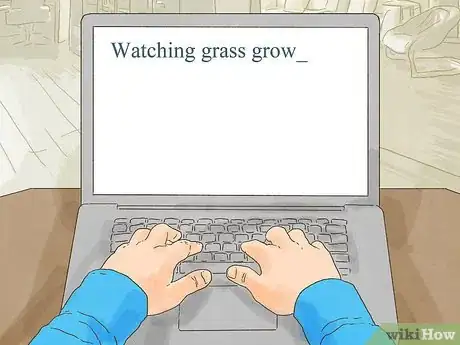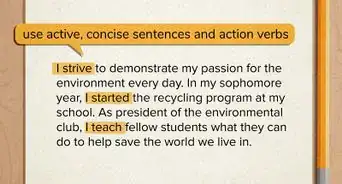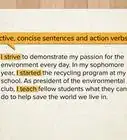This article was co-authored by Alexander Ruiz, M.Ed.. Alexander Ruiz is an Educational Consultant and the Educational Director of Link Educational Institute, a tutoring business based in Claremont, California that provides customizable educational plans, subject and test prep tutoring, and college application consulting. With over a decade and a half of experience in the education industry, Alexander coaches students to increase their self-awareness and emotional intelligence while achieving skills and the goal of achieving skills and higher education. He holds a BA in Psychology from Florida International University and an MA in Education from Georgia Southern University.
There are 7 references cited in this article, which can be found at the bottom of the page.
This article has been viewed 108,548 times.
Your college admissions essay is one of the most important parts of your college application. It's a chance to introduce yourself to the admissions officer reviewing your file and to set yourself apart from the other students applying. By carefully brainstorming ideas, drafting, and editing your essay, you can write a college admissions essay to be proud of.
Steps
Brainstorming Ideas for Your Essay
-
1Spend some time thinking about the question. Most admissions essays come with a prompt or a question you need to answer. Read the prompt or question carefully and then give yourself some time to think about it. Don't just go with the first idea that comes to mind when you read it.
- Consider writing down a list of ideas that come to you after you read the question or prompt. Once you've written your list, look it over and see which topics or ideas jump out at you as something you could write about.
- Some colleges or programs will give you several questions or prompts to choose from, or even give you the option of responding to more than one prompt. Choose the question(s) that you think you can answer the most effectively.
- Some places like the Common App will release the essay prompts from previous years, if you want to get an idea of what topics you might be asked to write about.[1]
-
2Avoid reusing essays for other applications. If you're applying to colleges, you're probably writing a lot of essays. Resist the temptation to just rework an essay from another application to fit the new prompt. It will be obvious to the admissions officer reading your essay if you're answering a different question.[2]
- If you have to write 2 essays from very similar prompts or questions, it's okay to reuse ideas or modify a previous draft. Just make sure that your essay effectively addresses all aspects of the prompt.
Advertisement -
3Think about what makes you different. When you're brainstorming ideas for your essay, think about the things that have made you stand out: what are your strengths? Your best personality traits? What types of compliments do you receive the most from your friends and teachers? These are good things to build an essay on.[3]
- For example, maybe you're a creative thinker, or a great problem-solver. Emphasize this in your essay by writing about a time that those qualities helped you in your day-to-day life.
-
4Don't limit yourself to reciting extracurriculars. When you're thinking about possible themes for your essay, remember that many applicants will have participated in the same groups and organizations as you have. To set yourself apart using the same things other people use will require some creativity.[4]
- Try to consolidate all your experiences into a resume or brag sheet. Then, break them down by how much time you spent with the organization or project. When did you start? Finish? What were your accomplishments? Your tasks and responsibilities? What were some of your successes and challenges?[5]
- Reflecting on those experiences will give you ideas for creative, unique ways you can portray them to admissions officers.[6]
-
5Tell them something new. Your essay also shouldn't just repeat things that you've already listed elsewhere on your application. Tell the admissions officer something they can't learn about you from the other paperwork you've filled out. It's okay to expand on points you only mentioned in passing in other parts of the application, but make sure you are adding new information and presenting it in an engaging, creative way.[7]
- For example, you could tell a story that illustrates how much you enjoy helping take care of others as a way to explain why you want to do a pre-med major.
- You could also explain how you overcame a particular fear.
-
6Tell a story. If you can tell a story in response to the prompt or question, do so. Telling a story will be much more engaging or interesting than just listing a bunch of reasons why you want to go to college. Admissions officers are often looking for students who can engage their audience, and the more interesting your essay is, the more an admissions officer will want to read it. A personal story can also help the reader connect with you on a personal level and learn something about who you are as a person.
- If you're not sure how to start this type of narrative/personal essay, you can look some examples up online to give you an idea of what you should be shooting for.
Drafting Your Essay
-
1Focus on one topic. Once you've brainstormed a list of ideas, choose one as the theme of your essay. Focusing on one theme helps keep your essay organized and to the point. Like any essay, the college admissions essay should have a clear thesis that summarizes your main ideas and presents your theme in an engaging way.[8]
- For example, your essay might focus on a situation where you found yourself questioning or challenging one of your own beliefs. Recount an incident in your life when this happened to you, and reflect on how the experience changed you. Start with a few lines that introduce the topic of your essay in a compelling and personal way.
-
2Have a great opener. The person reading your essay will be reading stacks of them, so getting their attention right away is a great way to get the reader's interest immediately. You could start with a quote, or a piece of advice you once received, or even a provocative way of setting up the theme of your essay.
- For example, maybe your essay is on how you're pursuing biology because you've always been interested in how things grow and survive in adverse conditions. You could say something like, “Watching grass grow is the most boring thing most people can think of. I love it.”
-
3Write in your own voice. Don't try to copy someone else's tone in your writing. You don't have to sound like anyone else, you just have to sound like you. An easy way to write in your own voice is by avoiding clichés. Don't use phrases that you've heard repeated over and over, unless you can put your own, creative spin on them.[9]
- For example, avoid saying things like "dream come true," "long story short," or "outside my comfort zone." Many, many people will use these phrases over and over, and relying on them prevents you from using your own words to describe your experience and feeling.[10]
-
4Write a first draft. Once you've chosen the topic for you essay, write a first draft. Don't worry about making it perfect, just write down everything you can think of that relates to your topic.[11]
- You might find it helpful to start with an outline listing the major points you want to cover.
-
5Show, don't tell. When you're writing your essay, provide examples to support the things that you're saying about yourself. Anyone can say they're a good leader or they love to learn, but what can set you apart is demonstrating how those things are true in your life.[12]
- For example, don't just say “I love being in leadership positions.” Instead, give examples of when you've been the leader in groups or taken the lead in situations with other people.
-
6Don't embellish. It's tempting to embellish or overstate what you've done when you're trying to make yourself stand apart from others. You should not do this in your essay under any circumstances. Don't say you've done something or been somewhere you haven't.[13]
-
7Don't overdo the humor. You might be tempted to try to make the admissions officer who is reading your essay laugh. Humor is a great way to make friends or break the ice with someone new, but you should try not to rely on it in your admissions essay. You have no way of knowing what the admissions officer's sense of humor is like, and you don't want to run the risk of a joke falling flat or, even worse, offending someone.[14]
-
8Use a positive tone. College can be difficult, and one thing that admissions officers might be looking for is evidence that you've overcome obstacles and been able to work through hard situations. Using a positive tone in your essay helps emphasize that you've been able to get through and learn from difficult situations.
- For example, if you're writing about a time when you helped a friend through the loss of a parent, part of your essay will obviously be sad. But you can also strike a positive tone by saying something like "It was one of the hardest things I've ever done, and it changed my friend in a lot of ways. But I also learned that you can never take a single day for granted and what it means to really be someone's friend."
-
9Appeal to your readers' emotions. Be honest and open about what getting into college means to you, personally. This will help the admissions officers connect with you and your story on a personal level, and will make your essay stand out. Don't exaggerate; just be sincere and earnest.
- For example, you might say, “I've known that I want to go to college for engineering ever since I went on a field trip to the Museum of Science and Industry in fourth grade. I'm always happiest when I'm working on a technical problem or surrounded by people who share my passion. When I toured the Big State U. robotics lab last month, I felt like I was home.”
-
10Tie it all together at the end. A powerful closing statement is just as important as a good opener. Look for a way to connect the ending of your essay to the themes you presented at the beginning. Use a few sentences to make a final point that underscores your main theme without repeating what you've already said.
- For example, maybe you started your essay by talking about how a teacher inspired your love for a particular subject. You might end by sharing something meaningful that that teacher said to you, or briefly summarizing how you grew as a person after taking their class.
Editing Your Essay
-
1Give yourself some space. After you've drafted your essay, walk away from it for a while. This could be for a few hours or a few days. Once you come back to it, it can be easier to see where it needs editing, what you can keep, and what just doesn't work.[15]
- For example, write your admissions essay on a Saturday morning and then don't look at it again until Sunday or Monday night. After writing it, you'll have a better idea of what you actually wanted to say. It will be obvious after some time away where you're saying what you mean and what areas need work.
-
2Proofread your essay. Once you've drafted your essay, reread and edit it more than once. Read your essay first to make sure that it says exactly what you want it to say. Then read it again for spelling and grammar errors.[16]
- You can also ask someone else to proofread your essay for you. Asking a teacher, parent, or older sibling is probably the best way to go, since they might be more familiar with what's expected from college admissions essays.[17]
-
3Write succinctly. Make sure that your essay does not exceed the maximum word and page length. This might mean cutting out whole sentences or it might mean using fewer words to say the same thing. If you have trouble with this, ask a friend to check your writing for unnecessary words.
- For example, instead of saying "I want to tell you about the process I went through to decide to become a doctor," you could say, "I want to share how I decided to become a doctor."
- In addition to excessive wordiness, check for unnecessary tangents. When you're drafting your essay, you may end up adding things you didn't originally plan on. Go through your essay and make sure these points serve the main purpose of your essay. If not, take them out.
-
4Vary your vocabulary. Don't use the same words over and over in your essay. Most word processing software has a “thesaurus” function. If you find you're repeating the same words, use it.[18]
- Make sure you're replacing your original vocabulary with words that mean the same thing. Different words have different connotations, and not every suggestion from the thesaurus will have the exact meaning you're looking for.
Expert Q&A
-
QuestionHow do I come up with a college essay topic?
 Alexander Ruiz, M.Ed.Alexander Ruiz is an Educational Consultant and the Educational Director of Link Educational Institute, a tutoring business based in Claremont, California that provides customizable educational plans, subject and test prep tutoring, and college application consulting. With over a decade and a half of experience in the education industry, Alexander coaches students to increase their self-awareness and emotional intelligence while achieving skills and the goal of achieving skills and higher education. He holds a BA in Psychology from Florida International University and an MA in Education from Georgia Southern University.
Alexander Ruiz, M.Ed.Alexander Ruiz is an Educational Consultant and the Educational Director of Link Educational Institute, a tutoring business based in Claremont, California that provides customizable educational plans, subject and test prep tutoring, and college application consulting. With over a decade and a half of experience in the education industry, Alexander coaches students to increase their self-awareness and emotional intelligence while achieving skills and the goal of achieving skills and higher education. He holds a BA in Psychology from Florida International University and an MA in Education from Georgia Southern University.
Educational Consultant Most college essay topics will be assigned to you by the Common App or whatever university you're applying to. If you're trying to think of ways to answer prompts, try making a brag sheet of things you've done or accomplished that you were proud of. Reflecting on those experiences could give you plenty of material to write about.
Most college essay topics will be assigned to you by the Common App or whatever university you're applying to. If you're trying to think of ways to answer prompts, try making a brag sheet of things you've done or accomplished that you were proud of. Reflecting on those experiences could give you plenty of material to write about. -
QuestionHow do I make my college essay stand out?
 Alexander Ruiz, M.Ed.Alexander Ruiz is an Educational Consultant and the Educational Director of Link Educational Institute, a tutoring business based in Claremont, California that provides customizable educational plans, subject and test prep tutoring, and college application consulting. With over a decade and a half of experience in the education industry, Alexander coaches students to increase their self-awareness and emotional intelligence while achieving skills and the goal of achieving skills and higher education. He holds a BA in Psychology from Florida International University and an MA in Education from Georgia Southern University.
Alexander Ruiz, M.Ed.Alexander Ruiz is an Educational Consultant and the Educational Director of Link Educational Institute, a tutoring business based in Claremont, California that provides customizable educational plans, subject and test prep tutoring, and college application consulting. With over a decade and a half of experience in the education industry, Alexander coaches students to increase their self-awareness and emotional intelligence while achieving skills and the goal of achieving skills and higher education. He holds a BA in Psychology from Florida International University and an MA in Education from Georgia Southern University.
Educational Consultant Don't feel like you have to limit yourself to the five-paragraph intro, body, body, body, conclusion format. When it comes to telling your story and sharing how valuable your experience will be to a school, portray it in the format that will be the most attractive to the school.
Don't feel like you have to limit yourself to the five-paragraph intro, body, body, body, conclusion format. When it comes to telling your story and sharing how valuable your experience will be to a school, portray it in the format that will be the most attractive to the school. -
QuestionHow do I start writing my essay?
 Kairavi AnjariaCommunity AnswerStart your essay with a good quote or a statement that reflects your whole theme perfectly. Make sure you write real experiences and do not make up stories.
Kairavi AnjariaCommunity AnswerStart your essay with a good quote or a statement that reflects your whole theme perfectly. Make sure you write real experiences and do not make up stories.
References
- ↑ Alexander Ruiz, M.Ed.. Educational Consultant. Expert Interview. 18 June 2020.
- ↑ http://www.huffingtonpost.com/marjorie-hansen-shaevitz/college-essay-tips-_b_1719862.html
- ↑ https://bigfuture.collegeboard.org/get-in/essays/8-tips-for-crafting-your-best-college-essay
- ↑ https://bigfuture.collegeboard.org/get-in/essays/tips-for-writing-an-effective-application-essay-college-admissions
- ↑ Alexander Ruiz, M.Ed.. Educational Consultant. Expert Interview. 18 June 2020.
- ↑ Alexander Ruiz, M.Ed.. Educational Consultant. Expert Interview. 18 June 2020.
- ↑ https://bigfuture.collegeboard.org/get-in/essays/tips-for-writing-an-effective-application-essay-college-admissions
- ↑ https://bigfuture.collegeboard.org/get-in/essays/tips-for-writing-an-effective-application-essay-college-admissions
- ↑ https://bigfuture.collegeboard.org/get-in/essays/tips-for-writing-an-effective-application-essay-college-admissions
- ↑ https://www.c2educate.com/locations/mount-kisco-ny/news/what-are-some-college-essay-cliches/
- ↑ https://bigfuture.collegeboard.org/get-in/essays/8-tips-for-crafting-your-best-college-essay
- ↑ https://bigfuture.collegeboard.org/get-in/essays/tips-for-writing-an-effective-application-essay-college-admissions
- ↑ https://www.usnews.com/education/blogs/professors-guide/2010/09/15/10-tips-for-writing-the-college-application-essay
- ↑ https://www.usnews.com/education/blogs/professors-guide/2010/09/15/10-tips-for-writing-the-college-application-essay
- ↑ http://www.huffingtonpost.com/marjorie-hansen-shaevitz/college-essay-tips-_b_1719862.html
- ↑ https://www.princetonreview.com/college-advice/college-essay
- ↑ https://bigfuture.collegeboard.org/get-in/essays/tips-for-writing-an-effective-application-essay-college-admissions
- ↑ http://www.huffingtonpost.com/marjorie-hansen-shaevitz/college-essay-tips-_b_1719862.html
About This Article
To write a college admissions essay, start by coming up with one or two life experiences related to the prompt. Then, choose one topic and focus on it, like a situation in your life that made you challenge your beliefs. Also, try to begin your essay in a unique way to grab the reader's attention, like by turning it into a story. Next, use a few detailed examples to show the skills you have, such as leadership, rather than using lots of different ones. In the conclusion, make a statement on your main theme without repeating yourself. For tips on how to edit your essay and what to avoid when writing it, read on!






































































